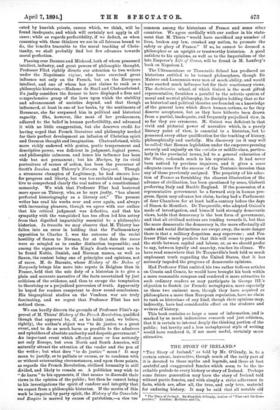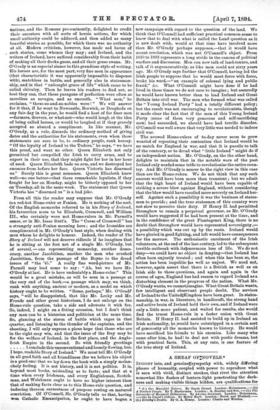THE STORY OF IRELAND.*
"THE Story of Ireland," as told by Mr. O'Grady, is, to a certain extent, instructive, though much of the early part of it is devoted to those myths and legends, and those at best doubtful and exaggerated fancies which seem to be the in- evitable prelude to every history or story of Ireland. Perhaps some future generation may have the story of Ireland told without poetic fancies, and with simply a strict adherence to facts, which are, after all, the true, and only true, matexial for enduring history. It may be said that all notable old • The Story of Ireland. By Standish O'Grady, Author of "Finn Rai his Corn. panioes." London: Methuen and Co. nations, and the Romans pre-eminently, delighted to credit their ancestors with all sorts of heroic actions, for which small authority could be adduced, and then added as many boastful stories as possible, for which there was no authority at all. Modern criticism, however, has made sad havoc of such stories, come whence they may ; and Ireland, and the writers of Ireland, have suffered considerably from their habit -of making all their ducks geese, and all their geese swans. Mr. 'O'Grady is an especial sinner in this grandiose style of writing. His heroes are, for the most part, very fine men in appearance .(that characteristic it was apparently impossible to dispense with), matchless in battle, and generally also in statesman- ship, and in that " nnbought grace of life" which came to be called chivalry. Then he leaves his readers to find out, as best they can, that these paragons of perfection were often as merciless as savages, and as uncouth. "What men," he -exclaims, "these-so-and-so-nobles were ! " We will answer for it that, if he went to Newcastle, Berwick, or Drogheda on any fair. dayin the year, he would find a host of far finer men —farmers, drovers, or what-not—who would laugh at the idea -of being called heroes, or would be laughed at if they gravely -accepted so absurd a compliment. In like manner, Mr. 'O'Grady, as a rule, discards the ordinary method of giving dates and the authorities for his statements, even when those statements are sure to be, to ordinary people, rank heresy. "Of the loyalty of Ireland to the Tudors," he says, "we have this proof, and want no other. Queen Elizabeth not only permitted but compelled the Irish to carry arms, and be expert in their use, that they might fight for her in her hour -of need. Queen Elizabeth bade us arm, and we destroyed her enemies from before her face. Queen Victoria has disarmed us." Surely this is great nonsense. Queen Elizabeth knew well—no one better—that these remarkable loyalists, if they fought for her on Monday, might be bitterly opposed to her on Tuesday, all in the same week. The statement that Queen Victoria has "disarmed us" is a bad joke.
From all this the reader may suppose that Mr. O'Grady is a red-hot Home-ruler or Fenian. He is nothing of the sort. Of the English monarchs referred to in his Story of Ireland, his favourites seem to be Elizabeth, Cromwell, and William EL, who certainly were not Home-rulers in Mr. Parnell's sense, or in Mr. Isaac Butt's. The "Curse of Cromwell" has a, strangely anti-Fenian meaning here ; and the Ironsides are .complimented in Mr. O'Grady's best style, when dealing with men whom he delights to honour. Indeed, the reader of The Story of Ireland will not deserve ridicule if he imagines that be is sitting at the feet not of a single Mr. O'Grady, but of several, — one representing monarchy, another demo- oracy, another Jacobitism, another the men who crushed Ja,cobitism, from the passage of the Boyne to the dread issues of "the '45." A really fine word-picture of Mr. Parnell may lead some to say : "Ah, but we have Mr. O'Grady at last. He is here undeniably a Home-ruler." This 'would be a great mistake, as will be seen in a passage at the very end of the book,—a passage which may, we think, tank with anything, ancient or modern, as a model on which history ought to be written. "Some, perhaps," Mr. O'Grady says, "will be disappointed, that like Mr. Leaky and Mr. Fronde and other great historians, I do not enlarge on the Home-rule question, take a side and advocate it with fire. So, indeed, I might on a fitting occasion, but I don't think any man can be a historian and politician at the same time. So, glancing at the storm of battle which rages in that quarter, and listening to the thunder of the captains, and the shouting, I will only express a pious hope that those who are in the right may win, and that the issue of the fray may be for the welfare of Ireland, in the first place, and the Anglo- Irish Empire in the second. So with friendly greetings
I conclude this unconventional and loosely flowing, but, I hope, readable Story of Ireland." We must tell Mr. O'Grady in all good faith and all friendliness (for we believe his object is a good one) that we lay down the book with a simply melan- choly feeling. It is not history, and it is not politics. It is, beyond most books, misleading as to facts; and that at a time when every Irishman, and every Englishman, Scotch- man, and Welshman ought to have no higher interest than that of making facts clear as to this Home-rule question, and inducing thereon earnestness of purpose resting on matured conviction. Of O'Connell, Mr. O'Grady tells us that, having won Catholic Emancipation, he ought to have began a
new campaign with regard to the question of the land. We think that O'Connell had sufficient practical common-sense to know that to deal with what is called the Land question as it is now dealt with, would at that time have involved more than Mr. O'Grady perhaps supposes,—that it would have meant revolution, which was not O'Connell's object. From 1830 to 1893 represents a long stride in the canons of political warfare and discussion. Men can now talk of land-tenure, and talk of it argumentatively, as like men could not sixty years ago. Mr. O'Grady says further that O'Connell, having led the Irish people to suppose that he would meet force with force, broke his word,—" an example of colossal lying and public fraud," &c. What O'Connell might have done if he had lived in these times we do not care to imagine ; but assuredly he would have known better than to lead Ireland and Great Britain into civil war. The men who formed what was called the "Young Ireland Party" had a totally different policy; but the result was not encouraging to revolutionists, though it made clear the fact that if the men of this Young Ireland Party (some of them very generous and self-sacrificing men) had succeeded, we should have had terrific disorder. O'Connell was well aware that very little was needed to induce civil war.
The avowed Home-rulers of to-day never seem to grow wearied of repeating their contention that Ireland would be no match for England in war, and that it is puerile to talk of the contrary, or to dread what "little Ireland" might do if an independent nation. Mr. O'Grady, on the the other hand, delights to maintain that in the notable wars of the past Ireland only needed some trifle to revolutionise the entire coun- try. And Mr. O'Grady is nearer to the right view in this case than are the Home-rulers. We do not think that any such success would have been more than transient ; but we admit that the high heart of Ireland would have been capable of striking a severe blow against England, without considering that the blow would have recoiled more severely on Ireland her- self. Against such a possibility it was the business of states- men to provide; and the true statesmen of this country were not slow to perceive their duty. If Henry II. had permitted Strongbow to remain a perpetual governor, as Mr. O'Grady would have suggested if he had been present at the time, and in the confidence of the great Plantagenet King, there is no doubt that Strongbow would have represented sovereignty ,— a possibility which was cut up by the roots. Ireland would have gloried in good fighting, and left would have consequences for the morrow. The enthusiastic enrolment of the Irish volunteers, at the end of the last century, led to the subsequent terrible outbreak with itsienormous loss of life. We do not deny—we could have no object in denying—that Ireland has often been unjustly treated ; and when this has been so, the action has been impolitic as well as unjust. We need not, however, again assert that there is a British as well as an Irish side to these questions, and again and again in the course of ages, England has had reason to regard Ireland as a disturbing element in the progress of the nation. What Mr. O'Grady wants, we cannotlimagine. What Great Britain wants, few intelligent and observant people doubt. The services of Ireland to the TJnitediliingdom have been great. In states- manship, in war, in literature, in handicraft, the strong hand and active brain of Ireland hold their own, and if Ireland were only a little more patient, and waited for results, she would find the truest Home-rule in a faster union with Great Britain. If Henry II. had assisted to build up in Ireland an Irish nationality, he:would have outstripped in a certain sort of generosity all the monarchs known to history. He would have sacrificed his friends to his enemies. Like many who came after him, he had to deal not with poetic dreams, but with practical facts. This, at any rate, is one feature of the trite story of Ireland.







































 Previous page
Previous page